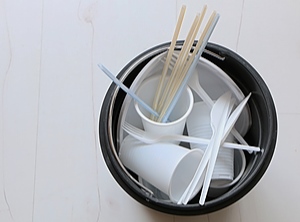INDIA
Ban on SUP straws to disrupt sales of small beverage packs / Soft drink makers expected to be badly hit / Paper industry set to offer alternatives
 India is planning to ban an array of SUP products from 1 July onwards (Photo: Panthermedia/Toberto) |
As part of India’s two-phase ban on single-use plastics (SUP), the country was set to eliminate the production, import, stocking, distribution, sales, and use of 19 plastic products including cutlery, plates, trays, cups, straws, stirrers, packaging films, cigarette packs, and PVC banners from 1 July 2022 (see Plasteurope.com of 14.04.2021). The ban on plastic straws in particular is likely to temporarily disrupt the sales of small packs of soft drinks, a favourite among the masses, according to UK data analytics company GlobalData (London; www.globaldata.com).
The margins on small drink packs in India are typically low as they retail at INR 10-INR 30 (EUR 0.13-EUR 0.38). Due to their mass-market appeal, however, pack sizes of 100 ml to 330 ml contributed 35.1% of overall soft drink volumes in the country last year. With plastic straws being a quintessential accessory for these small packs, soft drink companies are expected to be badly hit, says GlobalData.
Seemingly the next-best solution, paper, is chiming in to save the day for the beverage industry. The Indian Paper Manufacturers Association (www.ipmaindia.org) has announced that domestic paper mills are capable of producing sufficient straws for the industry. Leading FMCG companies such as Parle Agro, Amul, and Dabur are developing in-house capacities for paper straws; others are expected to follow suit.
Bobby Verghese, consumer analyst at GlobalData, says, “While the change is painful, in the long term, companies can gain consumer goodwill given that sustainable/environmentally friendly feature is an essential factor for 56% of Indian consumers while purchasing products, according to GlobalData’s 2022 consumer survey.”
This is India’s second attempt at banning SUP products. In 2018, the government under current prime minister Narendra Modi proposed banning SUPs by 2022, but backtracked on its commitment in 2019 and merely “recommended” that manufacturers and consumers work towards achieving the goal by 2022 (see Plasteurope.com of 18.10.2019).
According to a 2021 report by Australia’s non-profit Minderoo Foundation (Perth; www.minderoo.org), India ranks 94th in the world among the leading 100 countries that generate single-use plastic waste (the top three being Singapore, Australia, and Oman, in that order), with domestic production of 11.8 mn t/y and imports of 2.9 mn t/y.
The margins on small drink packs in India are typically low as they retail at INR 10-INR 30 (EUR 0.13-EUR 0.38). Due to their mass-market appeal, however, pack sizes of 100 ml to 330 ml contributed 35.1% of overall soft drink volumes in the country last year. With plastic straws being a quintessential accessory for these small packs, soft drink companies are expected to be badly hit, says GlobalData.
Seemingly the next-best solution, paper, is chiming in to save the day for the beverage industry. The Indian Paper Manufacturers Association (www.ipmaindia.org) has announced that domestic paper mills are capable of producing sufficient straws for the industry. Leading FMCG companies such as Parle Agro, Amul, and Dabur are developing in-house capacities for paper straws; others are expected to follow suit.
Bobby Verghese, consumer analyst at GlobalData, says, “While the change is painful, in the long term, companies can gain consumer goodwill given that sustainable/environmentally friendly feature is an essential factor for 56% of Indian consumers while purchasing products, according to GlobalData’s 2022 consumer survey.”
This is India’s second attempt at banning SUP products. In 2018, the government under current prime minister Narendra Modi proposed banning SUPs by 2022, but backtracked on its commitment in 2019 and merely “recommended” that manufacturers and consumers work towards achieving the goal by 2022 (see Plasteurope.com of 18.10.2019).
According to a 2021 report by Australia’s non-profit Minderoo Foundation (Perth; www.minderoo.org), India ranks 94th in the world among the leading 100 countries that generate single-use plastic waste (the top three being Singapore, Australia, and Oman, in that order), with domestic production of 11.8 mn t/y and imports of 2.9 mn t/y.
14.07.2022 Plasteurope.com [250702-0]
Published on 14.07.2022
